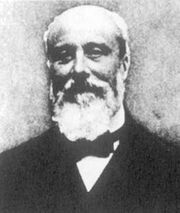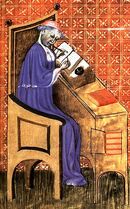Assessment |
Biopsychology |
Comparative |
Cognitive |
Developmental |
Language |
Individual differences |
Personality |
Philosophy |
Social |
Methods |
Statistics |
Clinical |
Educational |
Industrial |
Professional items |
World psychology |
Philosophy Index: Aesthetics · Epistemology · Ethics · Logic · Metaphysics · Consciousness · Philosophy of Language · Philosophy of Mind · Philosophy of Science · Social and Political philosophy · Philosophies · Philosophers · List of lists

Pierre Maurice Marie Duhem (10 June 1861 – 14 September 1916) was a French physicist and philosopher of science, best known for his writings on the indeterminacy of experimental criteria and on scientific development in the Middle Ages.
Life[]
At 11 he entered the College Stanislavs and in 1884 he published his first paper which was on electrochemical cells.
Philosophy[]
Duhem's views on the philosophy of science are explicated in La théorie physique: son objet et sa structure[1]. In this work he refuted the inductivist claim that Newton's laws can de deduced from those Kepler.[2]
His name is given to the Quine-Duhem thesis, which holds that for any given set of observations there are an innumerably large number of explanations. Thus empirical evidence cannot force the revision of a theory.
It should be cleared up, however, that as popular as the Duhem-Quine thesis may be in the philosophy of science, in reality Pierre Duhem and Willard Van Orman Quine stated very different theses. Pierre Duhem believed that only in the field of Physics we cannot refute a single individual hypothesis, but a whole theoretical group. He says in no uncertain terms that experimental theory in Physics is not the same as in the case of fields like physiology and certain branches of chemistry. Also Duhem's conception of theoretical group has its limits, since not all concepts are connected to each other logically. He did not include at all a priori disciplines such as logic and mathematics within these theoretical groups in Physics which can be tested experimentally. Quine, on the other hand, conceived this theoretical group as a unit of a whole human knowledge. Even mathematics and logic can be revised in light of recalcitrant experience, a statement that Duhem never held.
History of Science[]

Nicole Oresme, a prominent medieval scholar. Duhem came to regard the medieval scholastic tradition as the origin of modern science
Duhem is well known for his work on the history of science, which resulted in the ten volume Le système du monde: histoire des doctrines cosmologiques de Platon à Copernic. Unlike many former historians (e.g. Voltaire and Condorcet), who denigrated the Middle Ages, he endeavored to show that the Roman Catholic Church had helped foster Western science in one of its most fruitful periods. His work in this field was originally prompted by his research into the origins of statics, where he encountered the works of medieval mathematicians and philosophers such as Nicole Oresme and Roger Bacon, whose sophistication surprised him. He consequently came to regard them as the founders of modern science, having in his view anticipated many of the discoveries of Galileo and later thinkers. Duhem concluded that "the mechanics and physics of which modern times are justifiably proud to proceed, by an uninterrupted series of scarcely perceptible improvements, from doctrines professed in the heart of the medieval schools."[3]
Other works[]
Duhem is also known for his work in thermodynamics, being in part responsible for the development of what is known as the Gibbs-Duhem relation.
Bibliography[]
- Les théories de la chaleur (1895)
- Le mixte et la combinaison chimique. Essai sur l'évolution d'une idée (1902)
- L'évolution de la mécanique (1902)
- Les origines de la statique (1903)
- La théorie physique son objet et sa structure (1906)
- Études sur Léonard de Vinci. Paris, F. De Nobele, 1906-13; 1955. 3 v. 1. sér. I. Albert de Saxe et Léonard de Vinci. II. Léonard de Vinci et Villalpand. III. Léonard de Vinci et Bernardino Baldi. IV. Bernardino Baldi, Roberval dt Descartes. V. Thémon le fils du juif et Léonard de Vinci. VI. Léonard de Vinci, Cardan et Bernard Palissy. VII. La scientia de ponderibus et Léonard de Vinci. VIII. Albert de Saxe. 2. sér. IX. Léonard de Vinci et les deux infinis. X. Léonard de Vinci et la pluralité des mondes. XI. Nicolas de Cues et Léonard de Vinci. XII. Léonard de Vinci et les origines de la géologie. 3. sér. Les précurseurs parisiens de Galilée: XIII. Jean I. Buridan (de Béthune) et Léonard de Vinci. XIV. Le tradition de Buridan et la science italienne au XVIe siecle. XV. Dominique Soto et la scolastique parisienne.
- Sozein ta phainomena. Essai sur la Notion de Théorie physique de Platon à Galilée (1908)
- Traité de l'énergétique (1911)
- Le Système du Monde. Histoire des Doctrines cosmologiques de Platon à Copernic, 10 vols., (1913—1959)
References[]
- ↑ (The aim and structure of physical theory. Foreword by Prince Louis de Broglie. Translated from the French by Philip P. Wiener. Princeton, Princeton University Press, 1954)
- ↑ (a selection was published as Medieval cosmology: theories of infinity, place, time, void, and the plurality of worlds, edited and translated by Roger Ariew. University of Chicago Press, 1985).
- ↑ Pierre Duhem, Les origines de la statique, vol. 1, p. iv Harvard University Press. p. 38
- Lowinger, Armand, The Methodology of Pierre Duhem Columbia University Press, 1941
- Martin, R. N. D., Pierre Duhem: Philosophy and History in the Work of a Believing Physicist, 1991
- Stoffel, Jean-François, Pierre Duhem et ses doctorands: bibliographie de la littérature primaire et secondaire, Turnhout: Brepols, 1996, 325 p.
- Stoffel, Jean-François, Le phénoménalisme problématique de Pierre Duhem, Brussels, Académie royale de Belgique, 2002, 391 p.
See also[]
- Clausius-Duhem inequality
External links[]
- The Passion of Pierre Duhem - article about the censorship of Duhem's ideas.
- MacTutor Biography
de:Pierre Duhem fr:Pierre Duhem
| This page uses Creative Commons Licensed content from Wikipedia (view authors). |